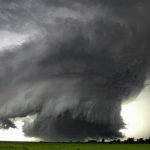We run our website the way we wished the whole internet worked: we provide high quality original content with no ads. We are funded solely by your direct support. Please consider supporting this project.

God’s Dream for the World
One of the grandest expressions of non-violent nature of God is found in Isaiah 11. Here God is dreaming of a time when his creation would be entirely free of violence. “The wolf will live with the lamb,” Isaiah says, and “the leopard will lie down with the goat.” So it will be with “the calf…the lion and the yearling,” and he adds that “a little child will lead them” (v.6). In that day, he continues, predators and their prey will eat and sleep alongside one another, for there will no longer be any carnivores. Even “the lion will eat straw like the ox” (v.7). In the end, there will be no fear between humans and animals, not even between young children and cobras (v 8). For humans as well as animals will neither “harm nor destroy” when God’s dream for creation is realized, because “the earth will be filled with the knowledge of the LORD as the waters cover the sea” (v.9).
This magnificent vision of creation in the future parallels God’s original vision for creation as it is reflected in the Genesis 1 account. God told the first couple that he had given them “every seed-bearing plant on the face of the whole earth and every tree that has fruit with seed in it… for food” (Gen 1:29). And he adds: “And to all the beasts of the earth and all the birds in the sky and all the creatures that move along the ground—everything that has the breath of life in it—I give every green plant for food” (Gen 1:29-30, emphasis added).
Talk about a passage acquiring significance in light of the cross! This passage makes it clear that God’s original plan was for the whole creation to be free of violence. This means that all violence among humans and within the animal kingdom is the result of something having gone wrong. As the passage from Isaiah makes clear, what is currently wrong is that our world is no longer “filled with the knowledge of the LORD.”
Through prophet Micah, the Lord expresses his dream that someday people,
… will beat their swords into plowshares and their spears into pruning hooks. Nation will not take up sword against nation, nor will they train for war anymore. (Mic 4:3)
When humanity is once again “filled with the knowledge of the LORD,” instruments of death will be transformed into instruments that support life, and people will no longer even be worried about the possibility of war.
What hope this beautiful anticipation of the future gives in light of the persistent threat of terror we currently live under!
In a similar way, the Psalmist declares that God,
… makes wars cease
to the ends of the earth.
He breaks the bow and shatters the spear;
he burns the shields with fire (Ps 46:9).
Here we see the Spirit of Christ breaking through to turn the warrior image of God on its head! God is indeed a heavenly warrior, but he is a warrior who “fights for peace.” God is not only non-violent. He’s passionately anti-violence! No wonder Jesus refused to call legions of angels to his defense!
Image by Will Bullas
Category: General
Tags: Character of God, Non-Violence
Related Reading

Sermon: Blood and Water
In this sermon clip, Greg Boyd talks about how question in baptism and communion have cause division in the church throughout history. In the rest of the sermon he discusses why baptism and Communion are important sacraments to the Christian community. Greg also shows us how the Anabaptists understood these sacraments and how Woodland Hills…

Why Does God’s Activity Seem So Arbitrary?
Why? It’s the question that never goes away. Why is one infant born sickly and deformed when at the same time another is born perfectly healthy? Why does tragedy repeatedly strike one family while another seems to enjoy uninterrupted peace? On and on we could go with examples. It all seems so arbitrary and unfair.…

ISIS, Islam & Jesus
http://youtu.be/7W5NWWFFJMg?list=PLB5r2P47beqLlY3wM6VKjwEEofXAZ4lX5 Our friend Bruxy taught a series at The Meeting House titled ISIS, Islam & Jesus that we wanted to share with you. This is episode one, and you can find the whole series by clicking here. If you believe in redemptive violence, you’ll be challenged by what he has to say.

Greg’s Response to Driscoll’s “Is God a Pacifist?” Part II
Waiting For The Word via Compfight To prove that “Jesus is not a pansy or a pacifist,” Driscoll by-passes the Gospels (understandably, given what Jesus has to say about the use of violence) and instead cites a passage from Revelation. This is a strategy Driscoll has used before. In an interview in Relevant Magazine several years…

When God Wears Masks
At various times throughout the OT we find Yahweh assuming the role of a tester, refiner, punisher and even an enemy of Israel (e.g. Jer. 9:7; Lam. 2:5; Isa 63:10). Yet, when we examine these roles, or masks, in the light of the crucified Christ and the broader canonical witness, it becomes clear that these…

Podcast: Is God Fickle?
Is there anything at stake in our life? Greg balances God’s mercy and grace with the authenticity of free will. http://traffic.libsyn.com/askgregboyd/Episode_0255.mp3
